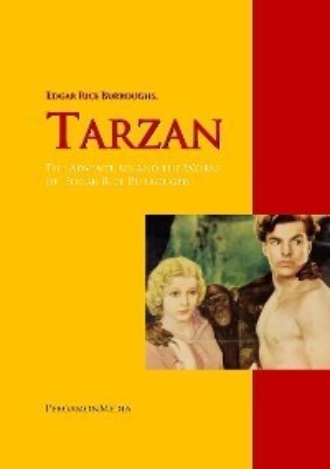
Полная версия
Tarzan: The Adventures and the Works of Edgar Rice Burroughs
Tarzan had slept for perhaps an hour or two despite the savage din of the revellers when his keen senses came suddenly alert to a suspiciously stealthy movement in the hut in which he lay. The fire had died down to a little heap of glowing embers, which accentuated rather than relieved the darkness that shrouded the interior of the evil-smelling dwelling, yet the trained senses of the ape-man warned him of another presence creeping almost silently toward him through the gloom.
He doubted that it was one of his hut mates returning from the festivities, for he still heard the wild cries of the dancers and the din of the tom-toms in the village street without. Who could it be that took such pains to conceal his approach?
As the presence came within reach of him the ape-man bounded lightly to the opposite side of the hut, his spear poised ready at his side.
"Who is it," he asked, "that creeps upon Tarzan of the Apes, like a hungry lion out of the darkness?"
"Silence, bwana!" replied an old cracked voice. "It is Tambudza—she whose hut you would not take, and thus drive an old woman out into the cold night."
"What does Tambudza want of Tarzan of the Apes?" asked the ape-man.
"You were kind to me to whom none is now kind, and I have come to warn you in payment of your kindness," answered the old hag.
"Warn me of what?"
"M'ganwazam has chosen the young men who are to sleep in the hut with you," replied Tambudza. "I was near as he talked with them, and heard him issuing his instructions to them. When the dance is run well into the morning they are to come to the hut.
"If you are awake they are to pretend that they have come to sleep, but if you sleep it is M'ganwazam's command that you be killed. If you are not then asleep they will wait quietly beside you until you do sleep, and then they will all fall upon you together and slay you. M'ganwazam is determined to win the reward the white man has offered."
"I had forgotten the reward," said Tarzan, half to himself, and then he added, "How may M'ganwazam hope to collect the reward now that the white men who are my enemies have left his country and gone he knows not where?"
"Oh, they have not gone far," replied Tambudza. "M'ganwazam knows where they camp. His runners could quickly overtake them—they move slowly."
"Where are they?" asked Tarzan.
"Do you wish to come to them?" asked Tambudza in way of reply.
Tarzan nodded.
"I cannot tell you where they lie so that you could come to the place yourself, but I could lead you to them, bwana."
In their interest in the conversation neither of the speakers had noticed the little figure which crept into the darkness of the hut behind them, nor did they see it when it slunk noiselessly out again.
It was little Buulaoo, the chief's son by one of his younger wives—a vindictive, degenerate little rascal who hated Tambudza, and was ever seeking opportunities to spy upon her and report her slightest breach of custom to his father.
"Come, then," said Tarzan quickly, "let us be on our way."
This Buulaoo did not hear, for he was already legging it up the village street to where his hideous sire guzzled native beer, and watched the evolutions of the frantic dancers leaping high in the air and cavorting wildly in their hysterical capers.
So it happened that as Tarzan and Tambudza sneaked warily from the village and melted into the Stygian darkness of the jungle two lithe runners took their way in the same direction, though by another trail.
When they had come sufficiently far from the village to make it safe for them to speak above a whisper, Tarzan asked the old woman if she had seen aught of a white woman and a little child.
"Yes, bwana," replied Tambudza, "there was a woman with them and a little child—a little white piccaninny. It died here in our village of the fever and they buried it!"
Chapter 12
A Black Scoundrel
When Jane Clayton regained consciousness she saw Anderssen standing over her, holding the baby in his arms. As her eyes rested upon them an expression of misery and horror overspread her countenance.
"What is the matter?" he asked. "You ban sick?"
"Where is my baby?" she cried, ignoring his questions.
Anderssen held out the chubby infant, but she shook her head.
"It is not mine," she said. "You knew that it was not mine. You are a devil like the Russian."
Anderssen's blue eyes stretched in surprise.
"Not yours!" he exclaimed. "You tole me the kid aboard the Kincaid ban your kid."
"Not this one," replied Jane dully. "The other. Where is the other? There must have been two. I did not know about this one."
"There vasn't no other kid. Ay tank this ban yours. Ay am very sorry."
Anderssen fidgeted about, standing first on one foot and then upon the other. It was perfectly evident to Jane that he was honest in his protestations of ignorance of the true identity of the child.
Presently the baby commenced to crow, and bounce up and down in the Swede's arms, at the same time leaning forward with little hands out-reaching toward the young woman.
She could not withstand the appeal, and with a low cry she sprang to her feet and gathered the baby to her breast.
For a few minutes she wept silently, her face buried in the baby's soiled little dress. The first shock of disappointment that the tiny thing had not been her beloved Jack was giving way to a great hope that after all some miracle had occurred to snatch her baby from Rokoff's hands at the last instant before the Kincaid sailed from England.
Then, too, there was the mute appeal of this wee waif alone and unloved in the midst of the horrors of the savage jungle. It was this thought more than any other that had sent her mother's heart out to the innocent babe, while still she suffered from disappointment that she had been deceived in its identity.
"Have you no idea whose child this is?" she asked Anderssen.
The man shook his head.
"Not now," he said. "If he ain't ban your kid, Ay don' know whose kid he do ban. Rokoff said it was yours. Ay tank he tank so, too.
"What do we do with it now? Ay can't go back to the Kincaid. Rokoff would have me shot; but you can go back. Ay take you to the sea, and then some of these black men they take you to the ship—eh?"
"No! no!" cried Jane. "Not for the world. I would rather die than fall into the hands of that man again. No, let us go on and take this poor little creature with us. If God is willing we shall be saved in one way or another."
So they again took up their flight through the wilderness, taking with them a half-dozen of the Mosulas to carry provisions and the tents that Anderssen had smuggled aboard the small boat in preparation for the attempted escape.
The days and nights of torture that the young woman suffered were so merged into one long, unbroken nightmare of hideousness that she soon lost all track of time. Whether they had been wandering for days or years she could not tell. The one bright spot in that eternity of fear and suffering was the little child whose tiny hands had long since fastened their softly groping fingers firmly about her heart.
In a way the little thing took the place and filled the aching void that the theft of her own baby had left. It could never be the same, of course, but yet, day by day, she found her mother-love, enveloping the waif more closely until she sometimes sat with closed eyes lost in the sweet imagining that the little bundle of humanity at her breast was truly her own.
For some time their progress inland was extremely slow. Word came to them from time to time through natives passing from the coast on hunting excursions that Rokoff had not yet guessed the direction of their flight. This, and the desire to make the journey as light as possible for the gently bred woman, kept Anderssen to a slow advance of short and easy marches with many rests.
The Swede insisted upon carrying the child while they travelled, and in countless other ways did what he could to help Jane Clayton conserve her strength. He had been terribly chagrined on discovering the mistake he had made in the identity of the baby, but once the young woman became convinced that his motives were truly chivalrous she would not permit him longer to upbraid himself for the error that he could not by any means have avoided.
At the close of each day's march Anderssen saw to the erection of a comfortable shelter for Jane and the child. Her tent was always pitched in the most favourable location. The thorn boma round it was the strongest and most impregnable that the Mosula could construct.
Her food was the best that their limited stores and the rifle of the Swede could provide, but the thing that touched her heart the closest was the gentle consideration and courtesy which the man always accorded her.
That such nobility of character could lie beneath so repulsive an exterior never ceased to be a source of wonder and amazement to her, until at last the innate chivalry of the man, and his unfailing kindliness and sympathy transformed his appearance in so far as Jane was concerned until she saw only the sweetness of his character mirrored in his countenance.
They had commenced to make a little better progress when word reached them that Rokoff was but a few marches behind them, and that he had at last discovered the direction of their flight. It was then that Anderssen took to the river, purchasing a canoe from a chief whose village lay a short distance from the Ugambi upon the bank of a tributary.
Thereafter the little party of fugitives fled up the broad Ugambi, and so rapid had their flight become that they no longer received word of their pursuers. At the end of canoe navigation upon the river, they abandoned their canoe and took to the jungle. Here progress became at once arduous, slow, and dangerous.
The second day after leaving the Ugambi the baby fell ill with fever. Anderssen knew what the outcome must be, but he had not the heart to tell Jane Clayton the truth, for he had seen that the young woman had come to love the child almost as passionately as though it had been her own flesh and blood.
As the baby's condition precluded farther advance, Anderssen withdrew a little from the main trail he had been following and built a camp in a natural clearing on the bank of a little river.
Here Jane devoted her every moment to caring for the tiny sufferer, and as though her sorrow and anxiety were not all that she could bear, a further blow came with the sudden announcement of one of the Mosula porters who had been foraging in the jungle adjacent that Rokoff and his party were camped quite close to them, and were evidently upon their trail to this little nook which all had thought so excellent a hiding-place.
This information could mean but one thing, and that they must break camp and fly onward regardless of the baby's condition. Jane Clayton knew the traits of the Russian well enough to be positive that he would separate her from the child the moment that he recaptured them, and she knew that separation would mean the immediate death of the baby.
As they stumbled forward through the tangled vegetation along an old and almost overgrown game trail the Mosula porters deserted them one by one.
The men had been staunch enough in their devotion and loyalty as long as they were in no danger of being overtaken by the Russian and his party. They had heard, however, so much of the atrocious disposition of Rokoff that they had grown to hold him in mortal terror, and now that they knew he was close upon them their timid hearts would fortify them no longer, and as quickly as possible they deserted the three whites.
Yet on and on went Anderssen and the girl. The Swede went ahead, to hew a way through the brush where the path was entirely overgrown, so that on this march it was necessary that the young woman carry the child.
All day they marched. Late in the afternoon they realized that they had failed. Close behind them they heard the noise of a large safari advancing along the trail which they had cleared for their pursuers.
When it became quite evident that they must be overtaken in a short time Anderssen hid Jane behind a large tree, covering her and the child with brush.
"There is a village about a mile farther on," he said to her. "The Mosula told me its location before they deserted us. Ay try to lead the Russian off your trail, then you go on to the village. Ay tank the chief ban friendly to white men—the Mosula tal me he ban. Anyhow, that was all we can do.
"After while you get chief to tak you down by the Mosula village at the sea again, an' after a while a ship is sure to put into the mouth of the Ugambi. Then you be all right. Gude-by an' gude luck to you, lady!"
"But where are you going, Sven?" asked Jane. "Why can't you hide here and go back to the sea with me?"
"Ay gotta tal the Russian you ban dead, so that he don't luke for you no more," and Anderssen grinned.
"Why can't you join me then after you have told him that?" insisted the girl.
Anderssen shook his head.
"Ay don't tank Ay join anybody any more after Ay tal the Russian you ban dead," he said.
"You don't mean that you think he will kill you?" asked Jane, and yet in her heart she knew that that was exactly what the great scoundrel would do in revenge for his having been thwarted by the Swede. Anderssen did not reply, other than to warn her to silence and point toward the path along which they had just come.
"I don't care," whispered Jane Clayton. "I shall not let you die to save me if I can prevent it in any way. Give me your revolver. I can use that, and together we may be able to hold them off until we can find some means of escape."
"It won't work, lady," replied Anderssen. "They would only get us both, and then Ay couldn't do you no good at all. Think of the kid, lady, and what it would be for you both to fall into Rokoff's hands again. For his sake you must do what Ay say. Here, take my rifle and ammunition; you may need them."
He shoved the gun and bandoleer into the shelter beside Jane. Then he was gone.
She watched him as he returned along the path to meet the oncoming safari of the Russian. Soon a turn in the trail hid him from view.
Her first impulse was to follow. With the rifle she might be of assistance to him, and, further, she could not bear the terrible thought of being left alone at the mercy of the fearful jungle without a single friend to aid her.
She started to crawl from her shelter with the intention of running after Anderssen as fast as she could. As she drew the baby close to her she glanced down into its little face.
How red it was! How unnatural the little thing looked. She raised the cheek to hers. It was fiery hot with fever!
With a little gasp of terror Jane Clayton rose to her feet in the jungle path. The rifle and bandoleer lay forgotten in the shelter beside her. Anderssen was forgotten, and Rokoff, and her great peril.
All that rioted through her fear-mad brain was the fearful fact that this little, helpless child was stricken with the terrible jungle-fever, and that she was helpless to do aught to allay its sufferings—sufferings that were sure to come during ensuing intervals of partial consciousness.
Her one thought was to find some one who could help her—some woman who had had children of her own—and with the thought came recollection of the friendly village of which Anderssen had spoken. If she could but reach it—in time!
There was no time to be lost. Like a startled antelope she turned and fled up the trail in the direction Anderssen had indicated.
From far behind came the sudden shouting of men, the sound of shots, and then silence. She knew that Anderssen had met the Russian.
A half-hour later she stumbled, exhausted, into a little thatched village. Instantly she was surrounded by men, women, and children. Eager, curious, excited natives plied her with a hundred questions, no one of which she could understand or answer.
All that she could do was to point tearfully at the baby, now wailing piteously in her arms, and repeat over and over, "Fever—fever—fever."
The blacks did not understand her words, but they saw the cause of her trouble, and soon a young woman had pulled her into a hut and with several others was doing her poor best to quiet the child and allay its agony.
The witch doctor came and built a little fire before the infant, upon which he boiled some strange concoction in a small earthen pot, making weird passes above it and mumbling strange, monotonous chants. Presently he dipped a zebra's tail into the brew, and with further mutterings and incantations sprinkled a few drops of the liquid over the baby's face.
After he had gone the women sat about and moaned and wailed until Jane thought that she should go mad; but, knowing that they were doing it all out of the kindness of their hearts, she endured the frightful waking nightmare of those awful hours in dumb and patient suffering.
It must have been well toward midnight that she became conscious of a sudden commotion in the village. She heard the voices of the natives raised in controversy, but she could not understand the words.
Presently she heard footsteps approaching the hut in which she squatted before a bright fire with the baby on her lap. The little thing lay very still now, its lids, half-raised, showed the pupils horribly upturned.
Jane Clayton looked into the little face with fear-haunted eyes. It was not her baby—not her flesh and blood—but how close, how dear the tiny, helpless thing had become to her. Her heart, bereft of its own, had gone out to this poor, little, nameless waif, and lavished upon it all the love that had been denied her during the long, bitter weeks of her captivity aboard the Kincaid.
She saw that the end was near, and though she was terrified at contemplation of her loss, still she hoped that it would come quickly now and end the sufferings of the little victim.
The footsteps she had heard without the hut now halted before the door. There was a whispered colloquy, and a moment later M'ganwazam, chief of the tribe, entered. She had seen but little of him, as the women had taken her in hand almost as soon as she had entered the village.
M'ganwazam, she now saw, was an evil-appearing savage with every mark of brutal degeneracy writ large upon his bestial countenance. To Jane Clayton he looked more gorilla than human. He tried to converse with her, but without success, and finally he called to some one without.
In answer to his summons another Negro entered—a man of very different appearance from M'ganwazam—so different, in fact, that Jane Clayton immediately decided that he was of another tribe. This man acted as interpreter, and almost from the first question that M'ganwazam put to her, Jane felt an intuitive conviction that the savage was attempting to draw information from her for some ulterior motive.
She thought it strange that the fellow should so suddenly have become interested in her plans, and especially in her intended destination when her journey had been interrupted at his village.
Seeing no reason for withholding the information, she told him the truth; but when he asked if she expected to meet her husband at the end of the trip, she shook her head negatively.
Then he told her the purpose of his visit, talking through the interpreter.
"I have just learned," he said, "from some men who live by the side of the great water, that your husband followed you up the Ugambi for several marches, when he was at last set upon by natives and killed. Therefore I have told you this that you might not waste your time in a long journey if you expected to meet your husband at the end of it; but instead could turn and retrace your steps to the coast."
Jane thanked M'ganwazam for his kindness, though her heart was numb with suffering at this new blow. She who had suffered so much was at last beyond reach of the keenest of misery's pangs, for her senses were numbed and calloused.
With bowed head she sat staring with unseeing eyes upon the face of the baby in her lap. M'ganwazam had left the hut. Sometime later she heard a noise at the entrance—another had entered. One of the women sitting opposite her threw a faggot upon the dying embers of the fire between them.
With a sudden flare it burst into renewed flame, lighting up the hut's interior as though by magic.
The flame disclosed to Jane Clayton's horrified gaze that the baby was quite dead. How long it had been so she could not guess.
A choking lump rose to her throat, her head drooped in silent misery upon the little bundle that she had caught suddenly to her breast.
For a moment the silence of the hut was unbroken. Then the native woman broke into a hideous wail.
A man coughed close before Jane Clayton and spoke her name.
With a start she raised her eyes to look into the sardonic countenance of Nikolas Rokoff.
Chapter 13
Escape
For a moment Rokoff stood sneering down upon Jane Clayton, then his eyes fell to the little bundle in her lap. Jane had drawn one corner of the blanket over the child's face, so that to one who did not know the truth it seemed but to be sleeping.
"You have gone to a great deal of unnecessary trouble," said Rokoff, "to bring the child to this village. If you had attended to your own affairs I should have brought it here myself.
"You would have been spared the dangers and fatigue of the journey. But I suppose I must thank you for relieving me of the inconvenience of having to care for a young infant on the march.
"This is the village to which the child was destined from the first. M'ganwazam will rear him carefully, making a good cannibal of him, and if you ever chance to return to civilization it will doubtless afford you much food for thought as you compare the luxuries and comforts of your life with the details of the life your son is living in the village of the Waganwazam.
"Again I thank you for bringing him here for me, and now I must ask you to surrender him to me, that I may turn him over to his foster parents." As he concluded Rokoff held out his hands for the child, a nasty grin of vindictiveness upon his lips.
To his surprise Jane Clayton rose and, without a word of protest, laid the little bundle in his arms.
"Here is the child," she said. "Thank God he is beyond your power to harm."
Grasping the import of her words, Rokoff snatched the blanket from the child's face to seek confirmation of his fears. Jane Clayton watched his expression closely.
She had been puzzled for days for an answer to the question of Rokoff's knowledge of the child's identity. If she had been in doubt before the last shred of that doubt was wiped away as she witnessed the terrible anger of the Russian as he looked upon the dead face of the baby and realized that at the last moment his dearest wish for vengeance had been thwarted by a higher power.
Almost throwing the body of the child back into Jane Clayton's arms, Rokoff stamped up and down the hut, pounding the air with his clenched fists and cursing terribly. At last he halted in front of the young woman, bringing his face down close to hers.
"You are laughing at me," he shrieked. "You think that you have beaten me—eh? I'll show you, as I have shown the miserable ape you call 'husband,' what it means to interfere with the plans of Nikolas Rokoff.
"You have robbed me of the child. I cannot make him the son of a cannibal chief, but"—and he paused as though to let the full meaning of his threat sink deep—"I can make the mother the wife of a cannibal, and that I shall do—after I have finished with her myself."
If he had thought to wring from Jane Clayton any sign of terror he failed miserably. She was beyond that. Her brain and nerves were numb to suffering and shock.
To his surprise a faint, almost happy smile touched her lips. She was thinking with thankful heart that this poor little corpse was not that of her own wee Jack, and that—best of all—Rokoff evidently did not know the truth.
She would have liked to have flaunted the fact in his face, but she dared not. If he continued to believe that the child had been hers, so much safer would be the real Jack wherever he might be. She had, of course, no knowledge of the whereabouts of her little son—she did not know, even, that he still lived, and yet there was the chance that he might.






